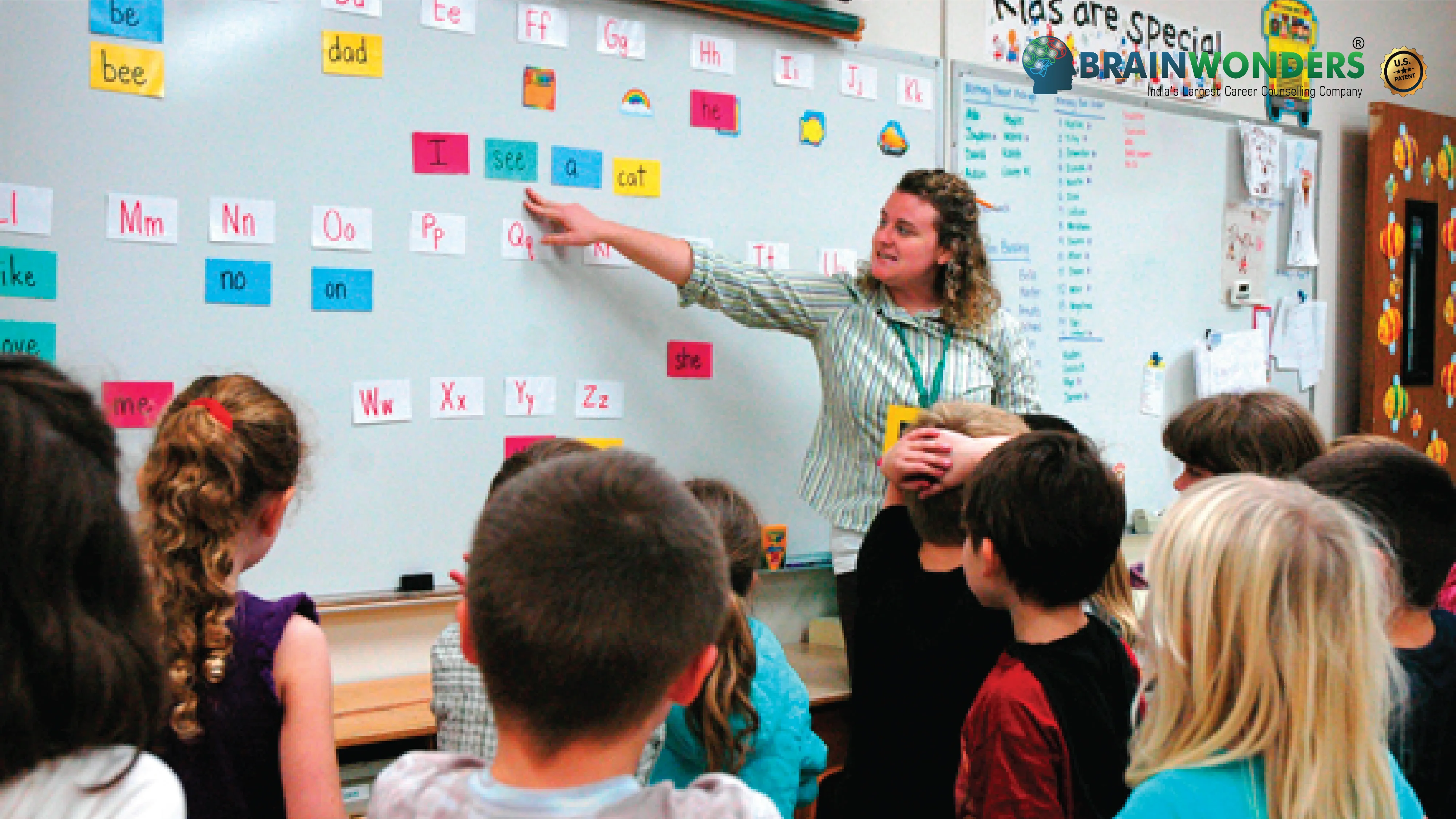How to become a Lecturer
Overview, Courses, Exam, Colleges, Pathways, Salary

Overview
Who is Lecturer ?
A lecturer is a title or post assigned to an educator who teaches students in senior secondary and higher education institutions such as universities and colleges. A lecturer is a post-secondary educator who has passed the UGC's National Eligibility Test and teaches both undergraduate and graduate students. Lecturers work part-time, which means they have a regular job and plan lessons around it. They may teach at night or on weekends if they have a normal nine-to-five employment. Lecturers, on the other hand, have a more amorphous educational need. They have professions outside of the college curriculum and are able to share their experiences with their pupils. Thus, their courses are more application-oriented than theoretical.
Colleges engage well-known guest speakers, which provides students with an excellent chance for networking. At a college, guest speakers are often rising stars, specialists, or well-known figures in their fields who are invited to campus by a professor or a specific department. Lecturers are in charge of classroom instruction and associated activities. The post is dependent on teaching credentials. Lecturers are required to teach in the classroom or laboratory, to meet with students during regular office hours, to grade assignments and exams, and to contribute to the creation and development of the course curriculum.
Lecturers with many years of experience may be invited to take on administrative responsibility for the department's course offerings or to educate and oversee less experienced colleagues. Although academics may work on part-time contracts, they must maintain an active research profile. Certain professors take a sabbatical (often up to one academic year) to focus more intently on their research efforts. A lecturer may advance to the level of associate professor with further credentials.
Typical day at work
What does Lecturer do?
Typical responsibilities of a lecturer are-
- Making lesson plans.
- Preparing and doing research on topics.
- Contacting Students, Organising classes and Checking Student work.
- Encouraging personal development through experiential learning and coaching.
- To be able to invigilate examinations.
- To be able to arrange work experience placements in the college.
- To attend staff meetings and be updated with the latest advancements in teaching.
- Also, liaising with other professionals/employers.
Abilities and Aptitude needed
What are the skills, abilities & aptitude needed to become Lecturer?
Here are some key abilities, skills, and aptitudes needed to become a lecturer:
- Educational Qualifications: Typically, a lecturer holds at least a master's degree in the relevant field of study, while a doctoral degree (PhD) is often preferred for higher education institutions and advanced subjects.
- Subject-Matter Expertise: In-depth knowledge and expertise in the subject you will teach are essential to convey information and answer students' questions effectively.
- Effective Communication: Strong oral and written communication skills are crucial for delivering lectures, explaining complex concepts, and engaging students.
- Presentation Skills: The ability to deliver clear, organized, and engaging lectures using various teaching aids, multimedia tools, and visual aids.
- Pedagogical Knowledge: Understanding effective teaching methods, learning styles, and educational theories to design and deliver engaging and impactful lessons.
- Adaptability: Being flexible and able to adjust teaching methods based on different students' needs and learning styles.
- Classroom Management: Skills in maintaining a positive and productive classroom environment, managing student interactions, and handling disciplinary issues.
- Problem-Solving: Ability to address challenges that may arise during lectures, discussions, and assignments and find effective solutions.
- Critical Thinking: Demonstrating strong analytical and critical thinking skills to evaluate different perspectives, engage in scholarly discussions, and guide students' intellectual development.
- Research Abilities: Conduct research in your field to stay current with the latest developments and contribute to advancing knowledge.
- Interpersonal Skills: Building positive relationships with students, colleagues, and other stakeholders to foster a collaborative and inclusive learning environment.
- Empathy and Patience: Understanding and addressing students' diverse needs, backgrounds, and abilities and being patient in guiding their learning journey.
- Time Management: Efficiently planning and organizing course materials, lectures, assignments, and assessments to meet deadlines.
- Feedback and Assessment: Providing constructive feedback to students on their work and using varied assessment methods to evaluate their understanding.
- Technology Proficiency: Comfort with using educational technology, online learning platforms, and digital tools to enhance teaching and engage students.
- Continual Learning: Commit to ongoing professional development, attending conferences and workshops, and staying updated in your field.
- Enthusiasm for Teaching: A genuine passion for imparting knowledge, inspiring curiosity, and contributing to students' intellectual growth.
- Ethical Standards: Adhering to academic integrity, ethical conduct, and maintaining high standards of professionalism.
- Advising and Mentorship: Providing guidance and mentorship to students beyond the classroom, helping them with academic and career-related decisions.
- Public Speaking: Confidence in public speaking and the ability to engage and captivate an audience.
Salary
Salary for Lecturer?
The salary of a lecturer is as follows :
- Minimum Monthly Income: Entry-level Lecturers in India typically commence their careers with a minimum monthly income of approximately INR 25,000 to INR 40,000. These educators deliver lectures, conduct classes, and engage in academic activities within their chosen field of expertise.
- Maximum Monthly Income: Experienced Lecturers, particularly those with advanced degrees, research contributions, and a reputation for effective teaching, can earn a maximum monthly income ranging from INR 60,000 to INR 1,00,000 or more.
- Annual Income: A Lecturer's annual income varies based on factors such as academic qualifications, research output, teaching effectiveness, and institutional reputation. Accomplished Lecturers who consistently inspire students, publish research, and contribute to their academic institution's growth may earn an annual income ranging from INR 3,00,000 to INR 12,00,000 or higher.
- Highest Earning Opportunities and Scope: Lecturers who attain senior faculty positions, lead research projects, publish in reputable journals, and demonstrate excellence in pedagogy may have opportunities for higher earnings. Additionally, those who excel in student mentorship, curriculum development, and interdisciplinary collaboration can expand their earning potential. The scope for Lecturers is promising as educational institutions continue to require knowledgeable and dedicated educators to impart quality education and contribute to academic advancements across diverse disciplines.
Pathways
How to become an Lecturer?
Entrance Exam
Entrance Exam for Lecturer ?
Courses
Which course I can pursue?
Best Colleges
Which are the best colleges to attend to become an Lecturer?
Industries
Which Industries are open for Lecturer?
Lecturers teach courses, deliver lectures, and facilitate learning in various academic and professional settings. While the primary role of a lecturer is within academia, their expertise and teaching skills are valuable in a range of industries that require education and training. Here are some industries that are open to hiring lecturers:
- Higher Education: Lecturers are a core part of universities, colleges, and higher education institutions, teaching undergraduate and graduate courses in various disciplines.
- Online Education and E-Learning: Lecturers can teach online courses and create educational content for e-learning platforms and online education companies.
- K-12 Education: Lecturers can work in primary and secondary schools, teaching subjects such as math, science, languages, and humanities.
- Language Institutes: Lecturers in language institutes teach foreign languages, ESL (English as a Second Language), and language proficiency courses.
- Technical and Vocational Training: Lecturers provide instruction in technical and vocational schools, teaching practical skills in mechanics, carpentry, and healthcare.
- Professional Development and Training Companies: Lecturers can deliver workshops, seminars, and training sessions for professionals in industries like business, healthcare, and technology.
- Healthcare Education: Lecturers in healthcare education programs teach medical students, nursing students, and other healthcare professionals.
- Law Enforcement and Criminal Justice Training: Lecturers train law enforcement officers, correctional officers, and other professionals.
- Military Training and Education: Lecturers may instruct military personnel on various subjects, including leadership, tactics, and technical skills.
- Corporate Training and Human Resources: Lecturers deliver training programs for corporate employees, covering topics such as leadership, communication, and compliance.
- Government and Public Sector: Lecturers can teach courses for government employees on public administration, policy, and governance.
- Museums and Cultural Institutions: Lecturers provide educational programs and lectures at museums, art galleries, and cultural centres.
- Nonprofit Organizations: Lecturers may work with nonprofit organizations to provide educational workshops and programs for community members.
- Environmental and Conservation Organizations: Lecturers provide education on environmental issues, conservation efforts, and sustainable practices.
- Research and Think Tanks: Lecturers may work in research institutions and think tanks, delivering lectures and presentations on research findings and policy analysis.
- Media and Broadcasting: Lecturers can work in media organizations, providing expertise and analysis on current events, politics, and social issues.
- Entertainment Industry: Lecturers may be hired to teach courses related to filmmaking, music, theatre, and other aspects of the entertainment industry.
- Tourism and Hospitality: Lecturers can provide training and education for individuals pursuing tourism, hospitality management, and event planning careers.
- Agriculture and Sustainable Farming: Lecturers may teach courses on agricultural practices, sustainability, and food production.
internship
Are there internships available for Lecturer?
Internship opportunities for aspiring lecturers, also known as teaching assistants or teaching fellows, can provide valuable experience in academia, classroom instruction, curriculum development, and educational support. Here are some potential internship options for individuals interested in pursuing a career as a lecturer:
- University and College Teaching Assistantships: Many universities offer teaching assistant (TA) positions where graduate students assist professors in teaching undergraduate courses, grading assignments, leading discussions, and providing academic support to students.
- Online Teaching Platforms: Some online education platforms offer internships for individuals interested in gaining experience in online course development, instructional design, and virtual teaching.
- Educational Institutions Abroad: Internships at international educational institutions provide exposure to different teaching methodologies, diverse student populations, and cultural experiences.
- K-12 Schools: Teaching assistant internships in primary and secondary schools involve working with teachers, helping with classroom management, and supporting students.
- Language Institutes: Internships at language institutes or schools offer opportunities to assist language instructors, develop teaching materials, and interact with students from various backgrounds.
- Summer Camps and Enrichment Programs: Teaching assistant internships in summer camps or enrichment programs allow you to work with children and teenagers in an educational and recreational setting.
- Special Education Centers: Internships at special education centres provide experience in supporting students with diverse learning needs and abilities.
- Community Colleges: Teaching assistant internships at community colleges involve assisting instructors in adult education programs and community-based courses.
- Test Preparation Centers: Some test preparation centres offer internships for individuals interested in assisting with SAT, ACT, GRE, or other standardized test preparation.
- Academic Support Centers: Internships in academic support centres involve providing tutoring, study skills workshops, and academic advising to students.
- Museums and Cultural Institutions: Teaching assistant internships at museums and cultural institutions focus on developing and delivering educational programs to visitors.
- Nonprofit Organizations: Nonprofits focused on education, and youth development may offer teaching assistant internships in after-school programs and educational initiatives.
- Research Assistantships: Internships as research assistants involve working with faculty members on research projects, data analysis, and academic publications.
- Online Course Development: Some educational organizations offer internships designing and developing online courses, including creating content and multimedia materials.
- Educational Technology Companies: Internships in educational technology companies involve working on tech products, software development, and digital learning tools.
- Corporate Training Programs: Teaching assistant internships in corporate settings involve assisting with employee training programs and professional development initiatives.
- Library and Information Science: Internships in library science or information science programs can involve assisting with library instruction and research support.
- Healthcare Education: Teaching assistant internships in healthcare education programs focus on training future healthcare professionals and medical students.
- Graduate Teaching Fellowships: Some universities offer teaching fellowships for graduate students, allowing them to gain teaching experience while pursuing advanced degrees.
Career outlook
What does the future look like for Lecturer?
Without a doubt, a country's kids ultimately form its future. If the kids are on the right track, the nation will follow suit. And it is the Lecturer who serves as the genuine guiding light for children. The professor is one of these individuals, since he or she is often in close touch with the kids. He is one who understands how to direct the youthful energy in the most beneficial manner. As a result, the instructor is in command of a country's progress.
As a professor, we might claim that he or she is the saviour of society, helpful in the development of a good human being from aimless youth. Being a professor is a serious profession that should not be taken lightly. As the number of senior secondary schools and colleges has increased, so has the need for Lecturers. As a result, there is great opportunity in the sphere of education for those who pursue this noble profession.







